How to Get into One of the Fastest Growing Fields - Data Science

Do you want to get into Data Science? We encourage you to. Don’t worry if you don’t know how! Here you’ll learn what you can expect and what will be expected of you.
In this article, we will be covering what Data Science is all about and some additional information about the industry. We will look at how you can get into the Data Science field with a relevant degree or without a degree and understand the data science career path. We will also discuss some salary benefits for a Data Scientist. We hope you are excited, and let’s get into it!!
What is data science?
Data science is the field of applying advanced analytics and machine learning solutions to help businesses extract insights and make informed decisions. Data science applies mathematical and scientific principles to extract valuable information from data for business decision-making, strategic planning, and getting a competitive advantage. Insights derived using Data science can increase the productivity and efficiency of the business.
To implement Data science methodologies, one of the most important aspects is getting the relevant data and cleaning/transforming it into a usable format. Thus, there are a wide variety of Data-related disciplines; for example, Data Engineering, Data Management, Data Governance, Data Science, Data Analytics, etc., but they are mostly divided into two major categories:
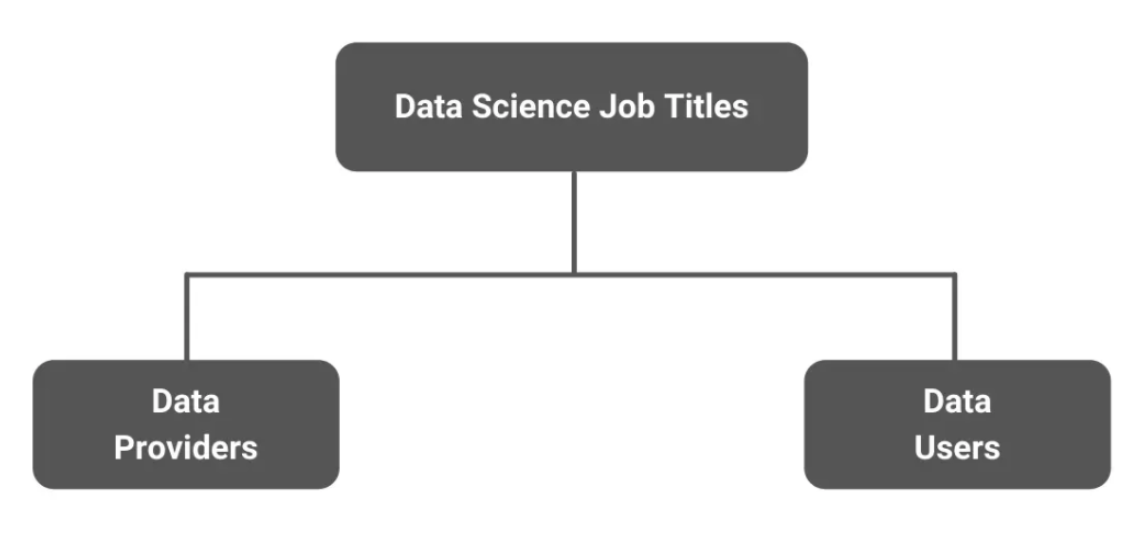
- Data Providers
- Data Users
For more information about the different data roles, we have a detailed article outlining all data science roles.
Data providers, as the name indicates, relates to jobs which include getting the data from different sources and landing it in one place. The jobs that focus on raw information fall under this category. This includes jobs related to handling unstructured data, designing databases, loading data, and building the data infrastructure. The Data provider's main responsibility is to make sure that the data is accurate and is in a usable format.
Data users, as the name suggests, relates to jobs which include extracting the information from the data and helping stakeholders in decision-making. The jobs majorly focus on analyzing the data, extracting insights, testing hypotheses, analyzing results of marketing campaigns, quantitative analysis, machine learning, and data visualization. Data users are typically Data Analysts, Statisticians, BI developers, Business Analysts, Quantitative Analysts, Machine Learning Engineers, etc.
For a more detailed article, you can check data science career paths.
Why is data science important?
According to a webinar held by Harvard University in October 2020, Jessica Stauth, managing director for data science and analytics at Fidelity Labs (a division of Fidelity investments), said that there is a “very clear relationship” between the data science work and the business results. She listed a number of potential economic advantages, including a higher return on investment (ROI), rising sales, more effective operations, better and faster go-to-market strategy, and improved customer engagement and satisfaction.
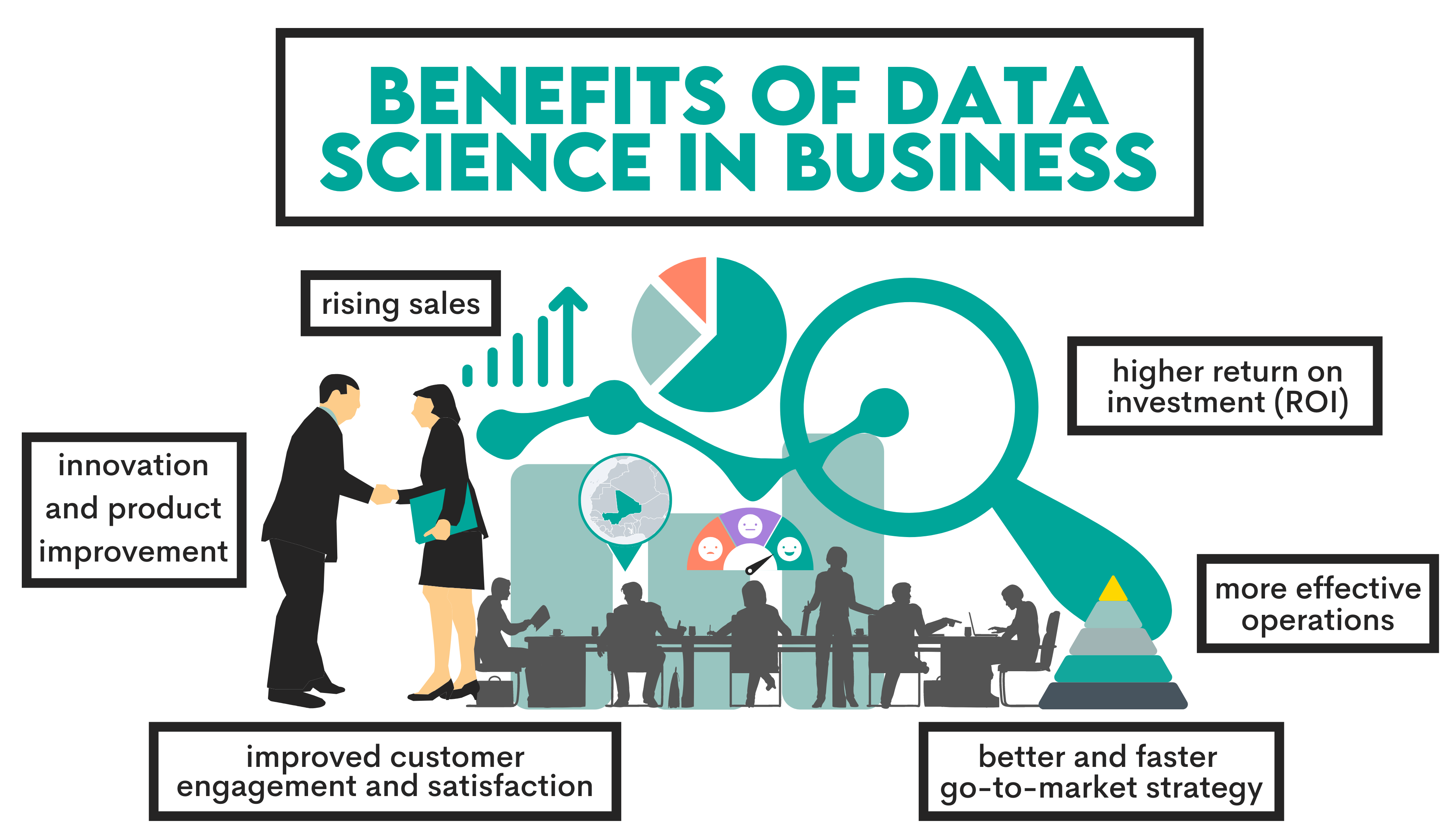
To remain competitive in the ever-changing markets, Data Science plays a vital role for companies to innovate. Data Science helps organizations to understand what their customers are saying about their product, identify pain points of their customers and build innovative solutions for them, thereby improving their product.
There are many companies that use Data Science widely, such as Meta/Facebook, Amazon, Apple, Netflix, Google, etc. So examples of innovative products backed by data science include Alexa by Amazon, which is a virtual assistant and does basic jobs using voice commands, Google’s apps like translate, maps, etc., and Netflix’s recommendation system, which shows the users what they might like, etc.
Machine learning or Data science not only help companies in product innovation but also in business process optimization. Data Science provides businesses with a wide range of options for streamlining key business procedures. For example, data science has become more prevalent in the manufacturing industry. Real-time tracking systems and sensor technology gather enormous amounts of data that the manufacturers utilize to eliminate snags in the process, keeping track of product flaws and quality, product testing, effectiveness, etc.
Now that we know how companies leverage machine learning and data science to improve their product as well as streamline processes, we will see what a Data Scientist actually does and how to get into data analytics.
What does a Data Scientist do?
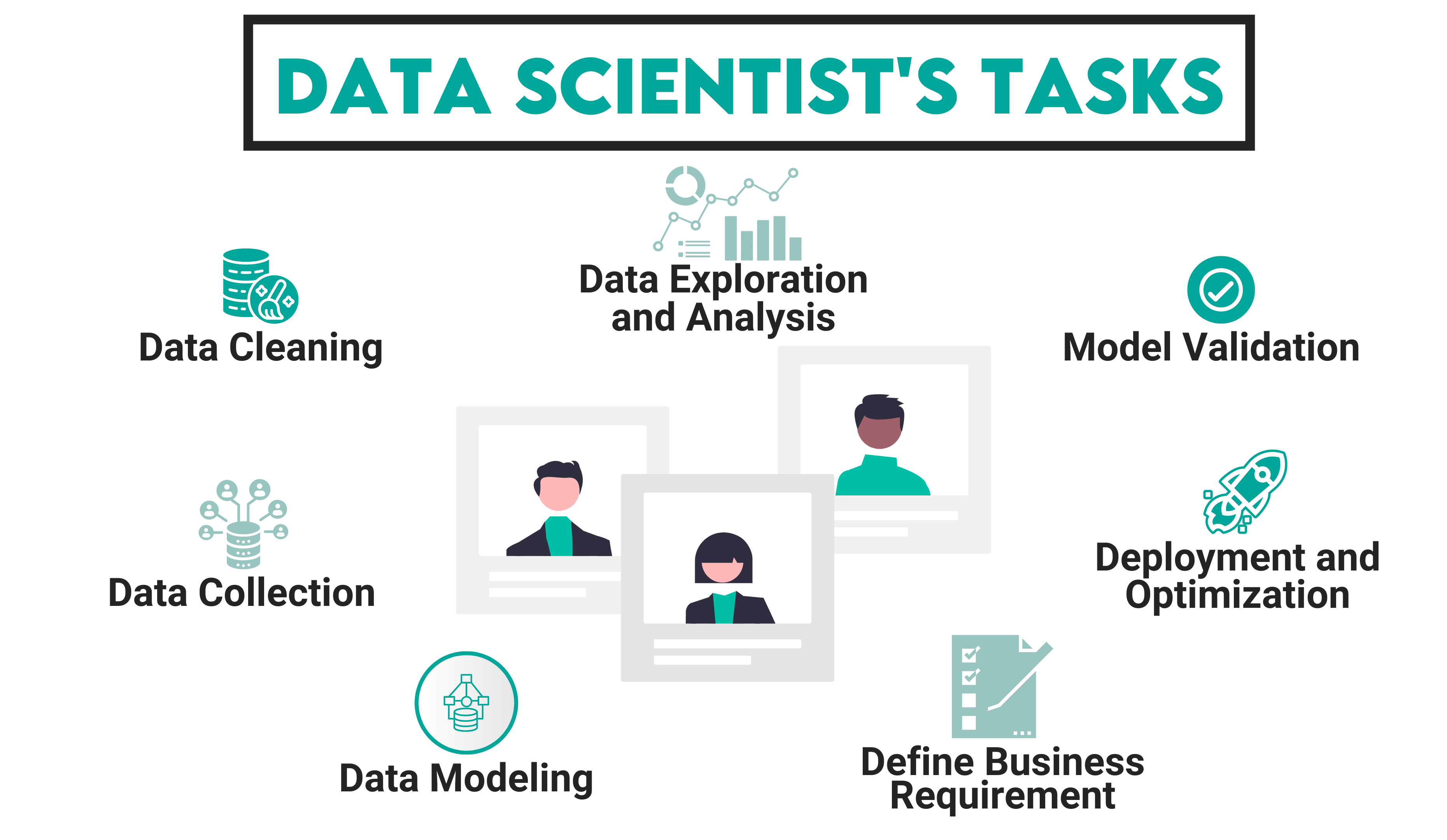
Data scientists are analytics professionals who support innovation in the workplace by assisting businesses in making well-informed decisions. For organizing, analyzing, and extracting insights from enormous sets of structured and unstructured data, data scientists are the go-to individuals in the organization.
These people are experts in problem-solving, machine learning, analytics, and interpreting insights to produce useful business decisions. They develop cutting-edge ML algorithms, predictive models, and data modeling procedures to extract the required data for business requirements.
The following are the duties that data science experts have for collecting and evaluating the data:
- Obtain the Data from a variety of sources.
- Cleaning and Processing of Data
- Combining the appropriate data sources in line with the requirements of the business
- Data Storage
- Exploratory Data Analysis
- Understand the Business problem and design potential solutions to solve the problem
- Results Evaluation and Improvement
- Delivering results to stakeholders for making informed decisions
- Repeat the process to solve another problem
Data Scientists play a vital role in the organization to identify patterns in the data and help businesses in product innovation, optimized strategy, and efficiency in operations. Data Scientists need to be very creative in the sense that they need to look at the problems in different ways, identify the business problems, understand what data to collect, analyze the trends and patterns, build machine learning models, and present insights.
Thus, a Data Scientist needs a huge set of skills right, from creative problem solving to building Data narratives and presenting the insights in an effective manner. In the next section of this article, we will look at how much a Data Scientist makes and what other aspects are part of their compensation.
Data Scientist Salary and Compensation?
The last couple of years has seen a huge interest in the Analytics job roles, especially, Data Scientist roles. If you do a quick search on any of the job aggregators sites such as LinkedIn, Indeed, Glassdoor, etc., you will realize that the market for analytics roles has increased as compared to a few years ago. Also, from the below chart, you can see the interest over time for the keyword “Data Science” according to the Google Trends data.
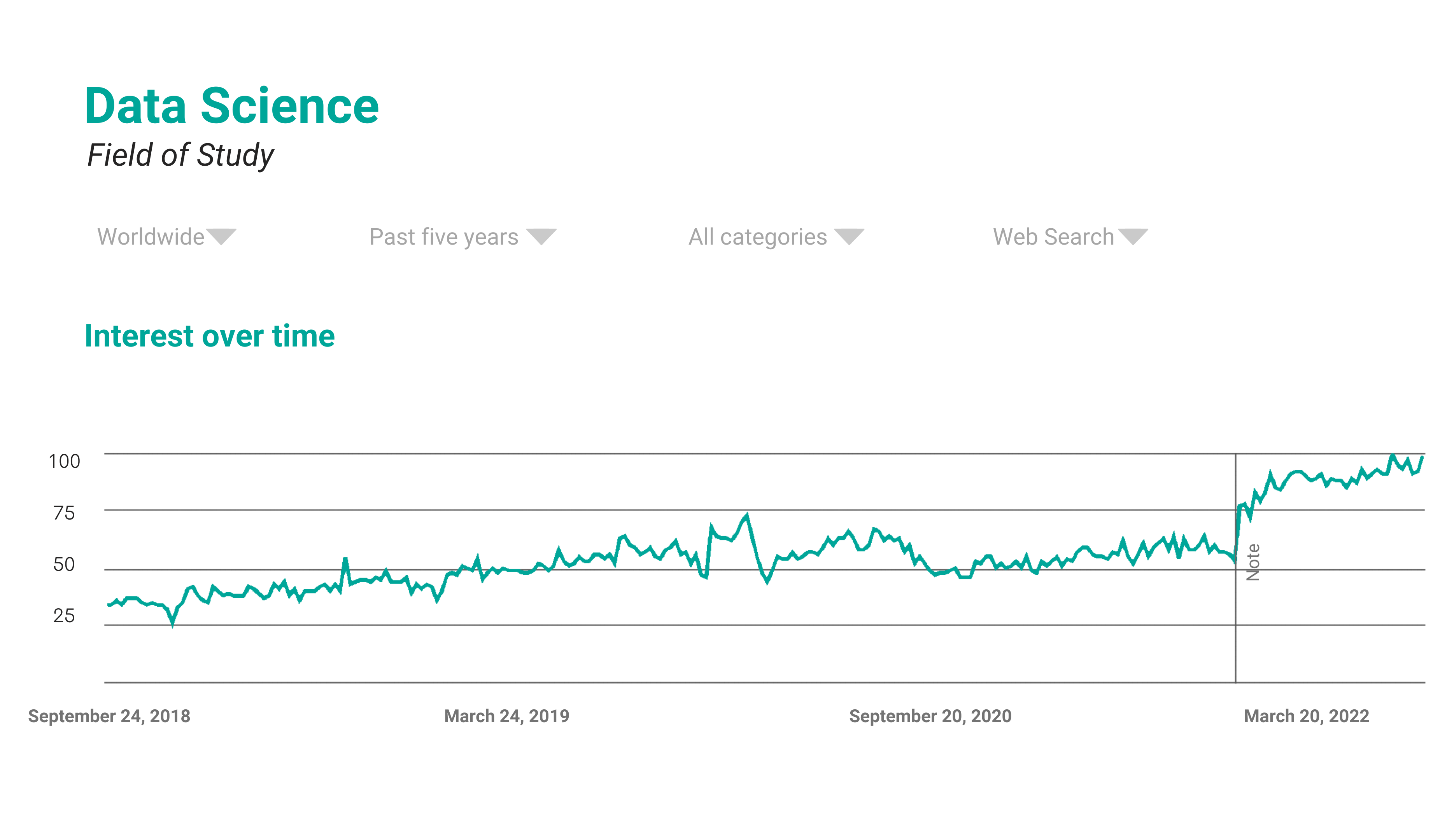
From startups to bigger companies, everyone is hiring either a Data Analyst or a Data Scientist. There is a huge demand in every industry to handle the modern era’s abundance of available data which means that these trends are likely to continue. In this section, we will look at the Data Scientist Salary based on their industries as well as the years of experience they have.
Before we delve deeper into the salaries for Data Scientists, let's take a look at different elements of a Data Scientists compensation. In the modern job roles (Analytics, Software Developers, etc.), the employees are not only given the base salaries but also they are compensated in many different ways.
Base salary is one part of the compensation structure. Apart from the base salary, there are other elements that the companies provide in their compensation structure to attract new talent and retain the existing employees. These other elements could be health insurance, dental insurance, retirement plans, stock options, and many more.
Health coverage
Health coverage or insurance coverage is a standard benefit that most of companies offer. There are various plans in the health insurance coverage that you can opt for. Sometimes the companies also offer health insurance coverage for spouses and families too. Other insurances the companies offer could be Life Insurance, dental insurance, and disability.
Stock Options
Many companies offer a stock plan for their employees. Some private companies and also public companies offer these plans. They offer stocks as ESOPS or Restricted Stock units to the employees. For example, if the company is public, they might offer ‘X’ amount of shares to the employees, and as the company progresses, share value increases, the employees would also be benefitted from the increase in the share price.
Bonus
Apart from the insurance and stock options, companies also offer bonus structure. Typically, a bonus is 10% of your base salary and is paid as per your annual performance.
Retirement Plan
Access to a retirement plan, such as a 401k, is another standard benefit for employees to save a portion of their paycheck to invest towards retirement, and can sometimes come with the additional perk of a match from the employer.
Data Scientist Salaries based on Career Progression
As in any profession, you will naturally earn more with more experience. As you start working in a company and gain more experience, your work experience will be valued, and the salary will increase accordingly. The salaries of the entry-level roles in the company will steadily increase as the seniority increases, and the job titles would also change. Over a period, a Data Analyst might move to a more senior position and sometimes management roles such as Data Science Lead, Analytics lead, or even chief data officer. The more experience you have, the higher you will be paid.
The difference in the compensation can also depend on which Data role you are at. For example, Data Analysts or Junior Data Analysts are considered to be entry-level roles, and Data Scientists are considered to be a bit senior roles. Thus, you would need a few years of experience as a Data Analyst to get to a Data Scientist, and that’s the reason a Data Scientist salary might be higher than that of a Data Analyst. However, it is important to remember that different companies may have slightly different standards for what an exact title or role may mean.
From the below chart, you can see the salaries for different roles in the analytics field. There is a huge variance in salaries from entry-level roles such as a Junior Data Analyst to a more senior management roles such as Data Director. We extracted the data from Glassdoor, Indeed, or PayScale, which is the most reliable source of salaries these days.
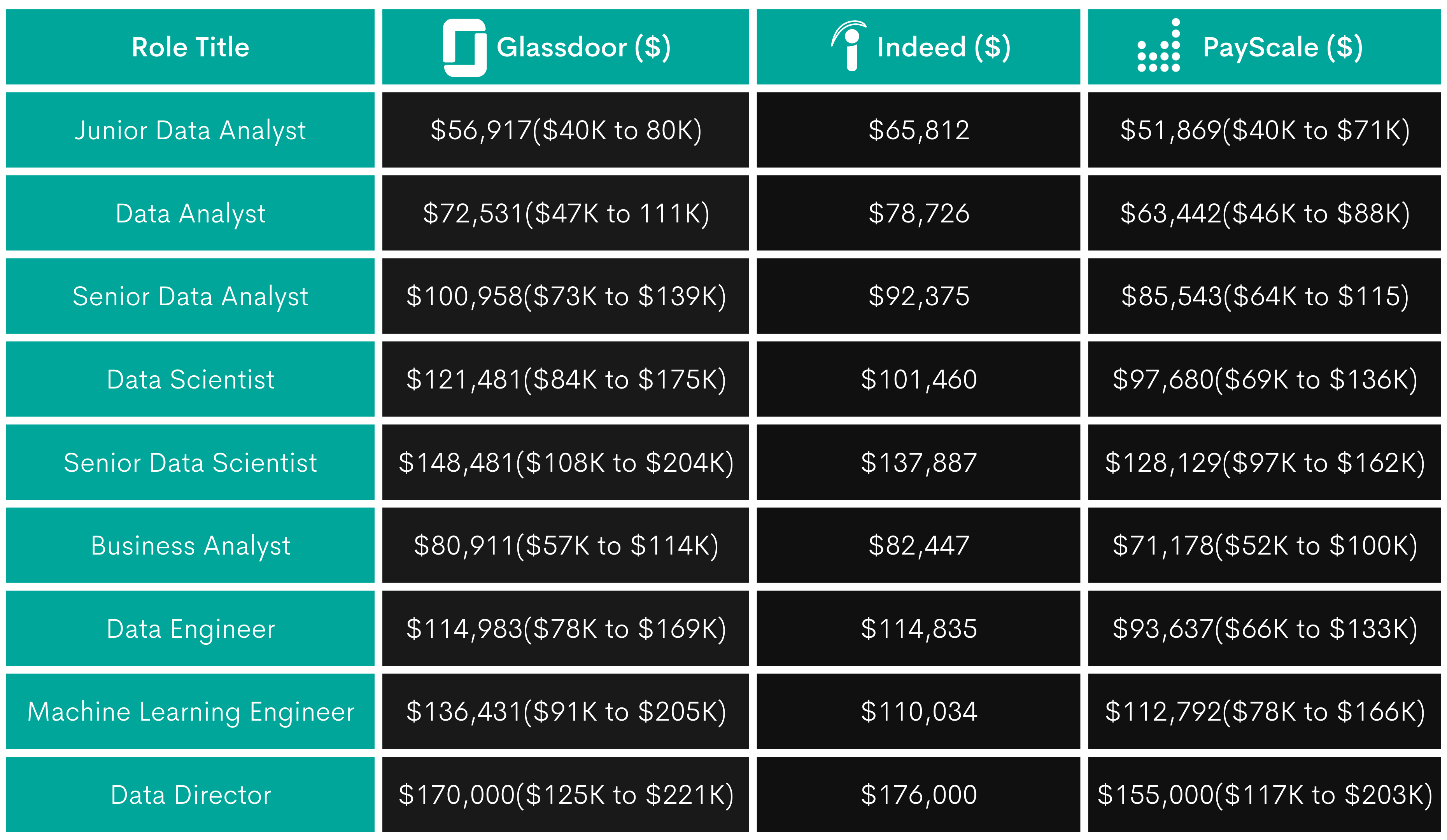
At each level in the analytics role, different skills are required. For example, an entry-level role might need more hands-on experience such as SQL, Excel, Python, and Data Modeling, while a senior role such as a Data Director might need skills such as People Management, Machine Learning expertise, Data Modeling, and System Design.
Data Scientist Salaries based on Industry
The salaries in the analytics roles also depend on the type of industry. The below chart shows the breakdown of data science salaries in different sectors and industries.

The Finance and Insurance industry includes banks, brokerages, and investment firms. The Tech industry falls into the information sector, as in the above infographic. The salaries in the tech and finance industries are greater than the median salary in data science.
Government jobs at the federal, state and local levels are on the lower end of compensation, though that is somewhat balanced out by benefits like pensions, a better work/life balance, and job security that you can't get in the private sector.
Ways to get into data science
There are various ways in which you can get into Data Science. You can get an education in such a way that you can directly enter the Data Science industry, or you can switch your career into data analytics from some other roles but doing some online courses or bootcamps. In this section of the article, we will be exploring in depth the type of education needed to get into data science and, if you don’t have the relevant education, how you can still get into this field.
What are the skills required as a Data Scientist?
As a Data Scientist, you would need a wide variety of skills. Just like a full-stack developer, the candidate should be a full-stack data scientist. Some of the most common data scientist skills are mentioned below:
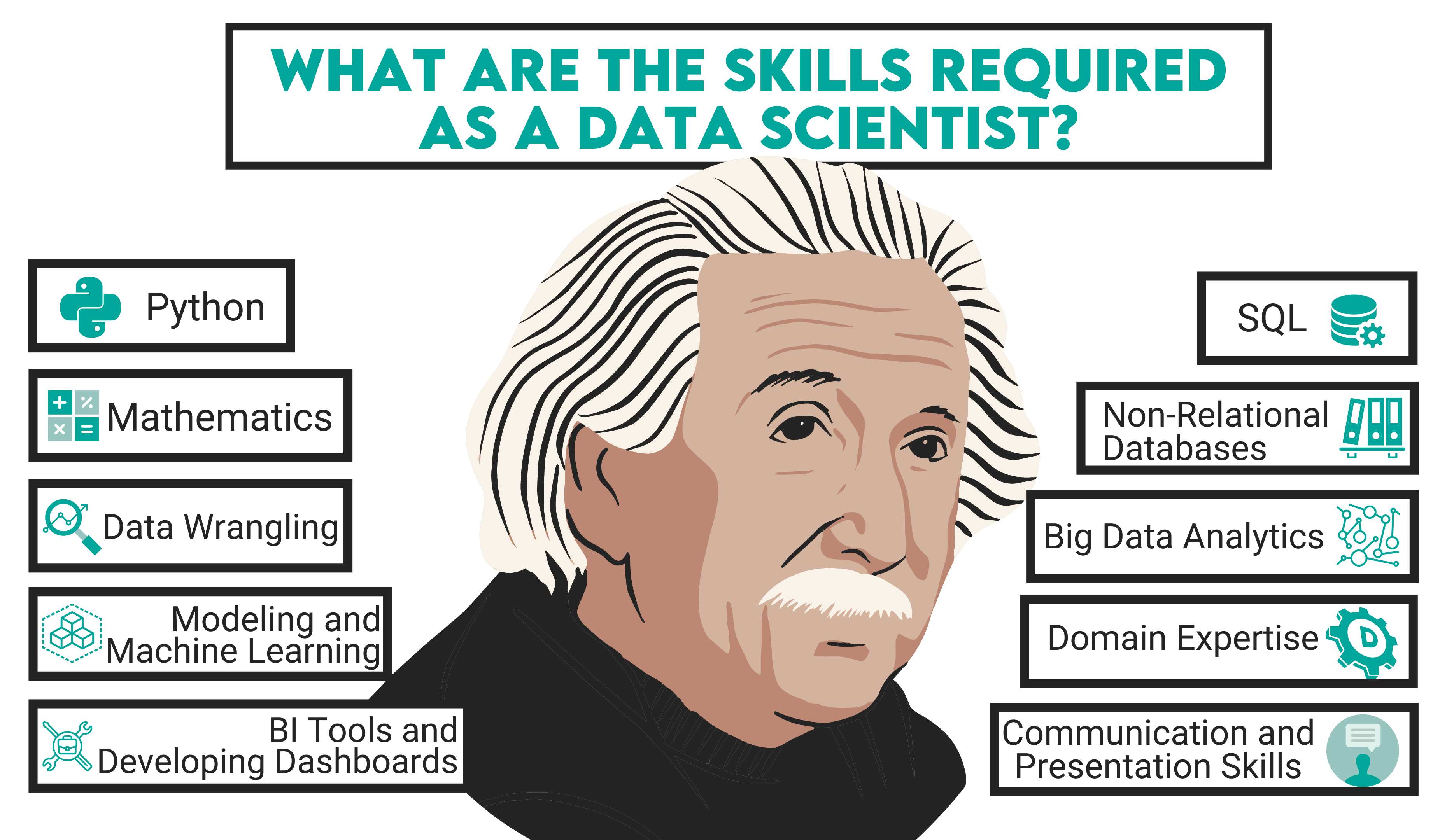
Programming skills
Strong programming abilities are crucial for candidates looking to become data scientists. Professional programmers create elegant solutions that are simple to comprehend, scalable, and error-free. As a result, hiring managers frequently favor candidates who have coding skills.
Python, SQL, and R are the most often used programming languages for data science and machine learning roles. Knowing several programming languages is beneficial because each has its own advantages and disadvantages. Although different businesses might have other languages they prefer, proficiency in these three will be sufficient for most of data science careers. Knowing one language can frequently shorten the time it takes to learn another, should you need to learn it.
Statistics/Mathematics
Depending on the firm and the exact function, the level of mathematical expertise needed for data science may vary, but the best data scientists are familiar with the underlying mathematical ideas behind the tools they employ.
Due to the technical nature of data science, mathematical data science abilities are important, and employers may ask candidates about their mathematical aptitude during interviews. A general understanding of the mathematics behind many kinds of data is preferred, even if it's unlikely that you'll frequently need to tackle challenging issues from scratch.
Data Wrangling and Data Preparation
As a data scientist, being able to manage data ensures that we have high-quality data for our prediction models, which allows us to trust the outcomes. One of the most in-demand technical data science skills is data wrangling because real-world initiatives rarely start with the ideal dataset instantly. The ability to create one's own datasets allows data scientists who can manage data to save time and have more time for model experimentation.
Modeling and Machine Learning
Many people think about predictive modeling when they hear the term "data scientist." Companies all across the world are looking for machine learning specialists to develop new technical solutions, categorize customers, or predict trends. One of the key data science competencies for entry-level positions is the ability to forecast outcomes.
Aspiring data scientists should attempt to comprehend machine learning algorithms, their applications, and their drawbacks. Candidates have the chance to test and hone their data science skills in advance using practice challenges like these on StrataScratch.
There are resources available on a variety of subjects, such as understanding the advantages of particular models, how to improve model performance, and classifying missing values.
Thus, before your next interview, it’s important to understand what are the skills required for a data scientist and get the answer to the question What Does a Data Scientist Do?
How to start a career in data science?
Education
At the nexus of statistics, mathematics, and computer science is where data science resides. And some other academic fields as well. Therefore, having an education in at least one of those subjects is a smart place to start.
It's not possible to create a manual that will apply to every applicant and job posting, but we will talk through a general guide to get into data science field. Getting at least a BS degree to have a solid foundation and to compete in the market for data science jobs is the usual rule of thumb and then incorporating professional experience. You can never go wrong with a dish that has a decent balance of the two.
It should come as no surprise that gaining more education and experience always puts you in a better position. Let's look at the qualifications for education and degrees:
- Bachelor in Science or Masters in Science Degree
- PhD
Bachelor in Science or Masters in Science Degree
It’s always a good idea to have a basic level of education such as a Bachelor’s degree to get into data science field. Having a bachelor’s or master’s degree is good for getting a job in Data Science. Most of the job postings have a minimum requirement of a bachelor’s degree. Nowadays, companies are changing their outlook toward education in general. For example, some companies such as Google and Meta have announced that they have removed the need for a bachelor’s degree, but the candidate would be assessed based on their interview only.
Bachelor’s degree or master's degree would definitely help you in getting an entry-level role in the Data Science industry.
PhD
PhD is not always required to get into Data Science, but it’s always great to have it. Some roles, such as Data Scientist or Senior Data Scientist, require a PhD degree if that role is more on a research side. For example, it would be great to have a PhD if you want to work as an ML engineer or in any other statistics/mathematics intensive job roles.
To understand in detail, head over to this post how to become a data scientist.
How to get into data science without a relevant or no degree?
We often get this question: Is it possible to get into the Data Science field without a relevant degree or no degree at all? So the answer is Yes!! You can definitely work as a Data Analyst/ Data Scientist even if you don’t have a degree. In fact, Google, Facebook, and many other companies announced that they would remove the degree criteria for their job roles.
If you don’t have a relevant degree and want to break into this field or if you don’t have any degree at all, there are options to learn the skills of Data Science either through an online course or a bootcamp.
Bootcamps
If you already have work experience in some other fields and you want to switch your career to analytics, bootcamps are a way to go. If you are experienced in some aspects of data science but don’t have a formal education, it doesn’t mean that you can’t work as a Data Scientist. Generally, if the position is higher, the degree matters less, and the only thing that matters is your work experience and knowledge in that field.
Bootcamps are a good starting point for learning new skills. Select a boot camp that offers courses in the field of Data Science. Examples include hands-on knowledge of Python, SQL, Machine Learning, etc. For enrolling in a boot camp, you won’t need a Bachelor’s or a Master’s degree. This is great for anyone who does not have a formal education in Data Science. There is a great bootcamp from Springboard for applied machine learning and its deployment.
Online Courses
Online courses are another way to get into Data Science. Many of the online courses provide a certificate at the end, which can be a good addition to your resume. For example, Google’s Data Analytics course would cover most of the basic as well as advanced topics required in this field and also give a certification at the end. Getting certified can be beneficial for you to get a new role in the Data Analytics industry.
There are many other online courses on Coursera. It has courses for everyone with all levels of experience. There are a few foundational courses which cover data science using Python, and while there are some advanced courses which cover tensorflow and keras. If you are a beginner or an experienced professional, you can find courses of all levels on Coursera.
Books
Another way to learn about data science is through books. Old and traditional way but really effective. The first book on the list is called Machine Learning Simplified. It’s a new book that was published in 2022 that covers the fundamentals of machine learning. It's a comprehensive guide that covers core concepts in Data preparation and data modeling.
Another go-to resource for Data Science is Python Data Science Handbook by Jake VanderPlas. This book covers the basics of data analysis using pandas and numpy and also about data visualization and machine learning. Having a book at your fingertips becomes really crucial when you want to quickly revise some concepts.
Projects
Lastly, you can learn about data science by doing hands-on projects. There are many projects on the internet along with explanation and the code that you can refer to.
The main point of doing the project is to understand what are the steps required to solve any problem and how to interpret the output and build a strong solution. StrataScratch has a new feature for Data Projects. You can start with the Data Project from DoorDash. In this project, you can look at the expected time of delivery when the order is placed.
There are many other websites which provide data analytics and machine learning projects. One such website is kaggle. By doing a hands-on project, you will be able to better grasp all the concepts in data science and machine learning.
You can find inspiration for your own project on the dataisbeautiful subreddit.
Summary
In this article, we looked at what Data Science is and how companies are implementing data science and machine learning capabilities to improve efficiency, enable product innovation, and help the stakeholders in making informed and data-driven decisions.
Data Science is one of the sexiest jobs in the 21st century, and the salary or compensation reflects the same. We looked at Data Science salaries based on the seniority of the position and based on the industry.
Also, we looked at different components of the compensation other than the base salary. We also looked at the education requirements for getting a job in this field.
StrataScratch can help you in getting a job in Data Science. As a Data Scientist, you need an understanding of SQL and Python, and we have a lot of practice questions on SQL and Python, which can be helpful to you in your next interview.


